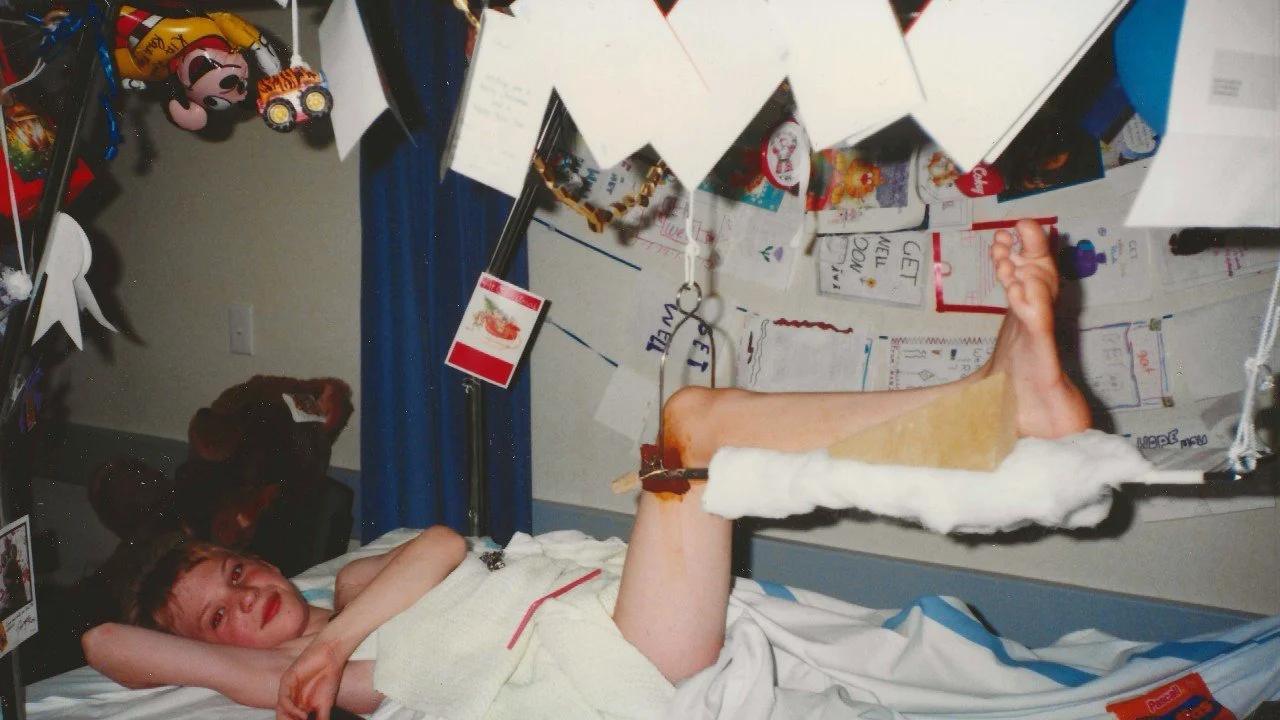Why Health: A Journey of Survival, Advocacy, and Giving Back
Photo of me in Hospital - circa 1996
Why Health?
People often ask me, 'Why health?' Why dedicate so much of your career to it?
The answer is both simple and deeply personal: because without health and the health system, I wouldn’t be here today.
At the age of 10, my life was turned upside down when I was hit by a car. I spent two years in the hospital, with ongoing rehabilitation and lifelong impacts. That experience left me disabled, with a traumatic brain injury, and dependent on health and disability systems for much of my young life.
What I remember most, though, is not just the pain or the challenges. It’s the kindness. It’s the nurses who sat with me at night, the physiotherapists who coaxed me through painful exercises, the teachers and mentors who visited and reminded me that I could still dream big. They, alongside my whānau and friends, gave me hope.
“Health is not just a career I chose. It is why I am still alive.”
A Life Shaped by Health and Disability
That early experience of trauma shaped me in ways I could never have predicted. I once dreamed of becoming a nurse or doctor myself, inspired by those who cared for me. But I soon realised my body would not withstand the long hours on my feet and the physical intensity those roles required.
So, I found other ways to give back.
Since leaving university, I have worked across health in many forms:
Radiology, where I started my career in the technical, behind-the-scenes part of the system.
As a community advocate with Enabling Good Lives (EGL), where I brought a Tangata Whaikaha Māori perspective to system design.
A secondment to the Ministry of Health as Regional Director of EGL Waitaha, helping guide an EGL and Whānau Ora Outcomes kaupapa model of disability support.
Later, as a Principal Advisor, I assisted with the system transformation of Disability Support Services across Aotearoa.
When COVID-19 struck, everything shifted. My mahi pivoted repeatedly, from leading disability equity advice in the national response, to designing policy and practice that kept disabled people safe, to embedding inclusion in the Vaccination Programme.
I’ve even contributed to every emergency health response since the Christchurch Earthquakes, learning again and again that crises reveal the cracks in our systems, and that equity cannot wait for calmer times.
Now at Health New Zealand | Te Whatu Ora as National Manager of Disabled People’s Health, embedding disability responsiveness into hospital and specialist services.
This journey isn’t only professional. It’s also deeply personal. When Frankie and I prepared to welcome Hiwa-i-te-Rangi, we were supported by Te Puāwaitanga o Ōtautahi Trust and Māori Midwives Ki Tahu. They guided us through parental classes and the safe birthing of Hiwa through mātauranga Māori. That aroha and support meant the world to us as new parents.
Today, I serve as a board member of Te Puāwaitanga o Ōtautahi Trust, another way of giving back to the very community that held us when we needed it most.
Intersectionality in Health
Why health? Because health is where inequities are felt most acutely.
My own survival depended on health professionals who saw me as more than a diagnosis. That is what intersectionality teaches us: that none of us lives a single identity at a time.
A disabled Māori elder faces barriers that are not the same as those faced by a Pākehā disabled elder.
A Pacific Rainbow youth experiences stigma and isolation differently from a straight Pacific youth.
A rural refugee whānau with language barriers navigates the system differently from urban Pākehā whānau.
These are not “edge cases.” These are the very people most at risk of falling through the cracks.
Intersectionality, for me, is not just a theory. It’s personal. It’s the reality of my own life, and the reality of the communities I represent and serve.
“Health isn’t abstract. It’s survival. And when systems fail to see people in their full intersectional realities, survival itself is put at risk.”
Giving Back to the System That Gave to Me
I am incredibly proud of what I have been part of in health spaces. From supporting EGL system transformation, to standing up disability-inclusive responses during COVID-19, to shaping vaccination strategies that recognised diverse needs, all of it has been about embedding equity at the centre.
But I also know this mahi is never mine alone. It belongs to the frontline nurses, doctors, administrators, practice managers, paramedics, physios, carers, Māori midwives, and back-office staff who make the system work day after day.
To you, I say thank you. Thank you for giving me a second chance at life when I was 10. Thank you for supporting disabled people, Māori, Pacific, Rainbow, migrants, and others who too often feel unseen. Thank you for inspiring me to dedicate my life to this mahi.
Working in health is not just my job. It is my why. It is my way of giving back to a system that saved me, to the communities who nurtured me, and to whānau who deserve equity, dignity, and hope.
“We don’t just build health systems to treat illness. We build them to give people the chance to live, to dream, and to thrive.”
🔗 Follow me for more reflections on systems change, equity leadership, and human rights diplomacy.
🖤 Ko te pae tawhiti whāia kia tata. Ko te pae tata whakamaua kia tīna. | Seek out the distant horizons so they may become close. Hold fast to the close horizons so they may be secured.


